About
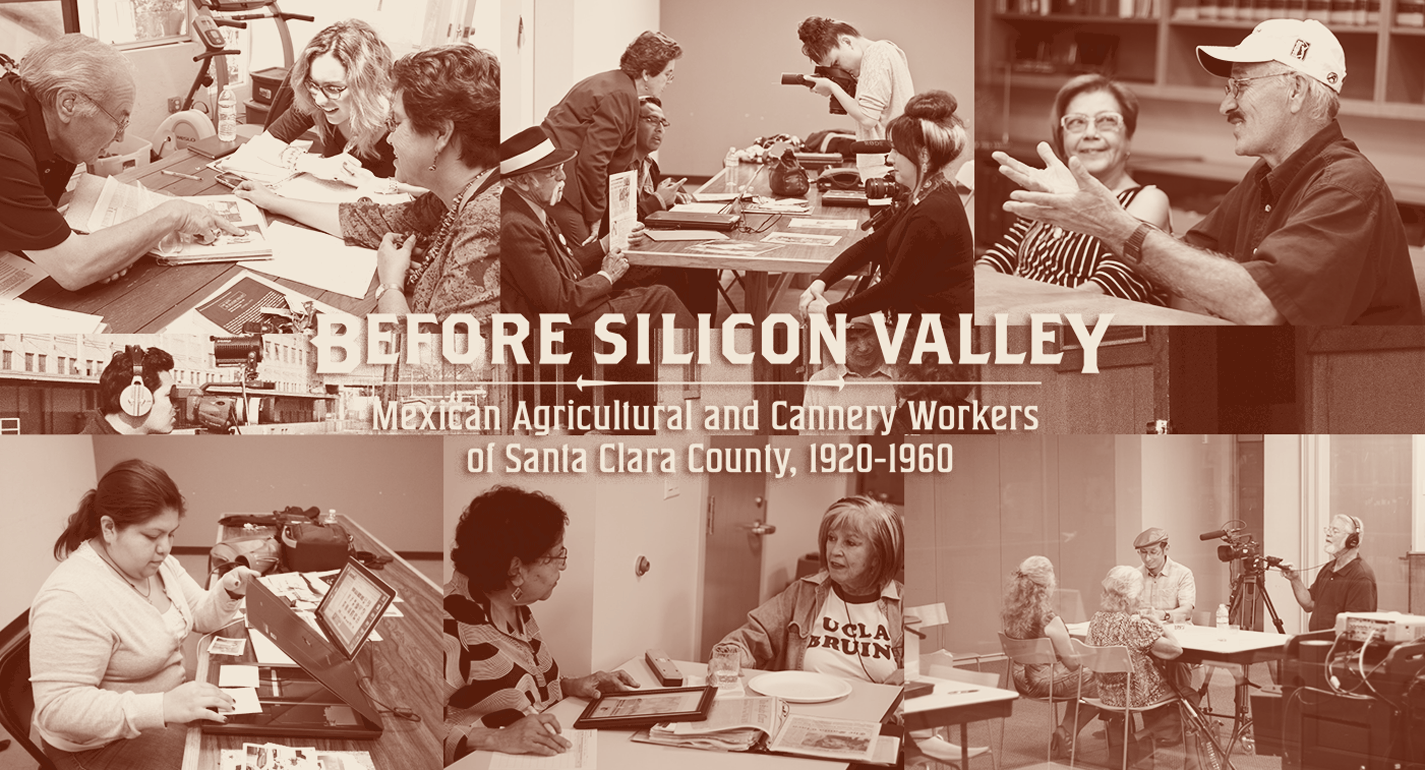
In 2002-2003, the City of San José contracted Suzanne Guerra to revise and update the National Register nominations for the De Anza Hotel and the Palomar Ballroom for a development project downtown. While still significant for its architecture and construction, the National Register nomination for the Palomar Ballroom had included only minimal documentation on the LatinX community with which it was historically associated. The City of San José had not previously developed a historic context for Mexican Americans in the 20th Century. This left the question of the level of significance to be determined. Documentation of historical resources, buildings, structures, objects, sites, and cultural landscapes typically include archival and oral history research. Oral history projects are framed within an historic context based on archival research, which considers events, places and people.
A thorough search of regional archives revealed the lack of documentation on the local Mexican American community available in any regional archive or published history. Though the histories of many agricultural industries have been written, agricultural and cannery worker communities have not been as well documented. In order to address the lack of documentation on worker communities, our contracts, pursued by Guerra & McBane LLC, now specified that oral history interviews were always accompanied by the digital retrieval of personal archives and that a copy of the final studies and reports would be donated to a publicly accessible repository.
Based on our initial research from 2003-2005 we framed a project concept that we called Cherries to Chips: A Regional History of Santa Clara Valley Communities. We envisioned a comprehensive history of agricultural worker communities of the Santa Clara Valley and its transformation from one of California’s major agricultural landscapes into the internationally recognized technological incubator known as the “Silicon Valley”. In 2004-2006, The Sourisseau Academy for State and Local History of the SJSU History Department gave our project $3,000 to conduct oral history interviews with Mexican cannery workers in Santa Clara County.
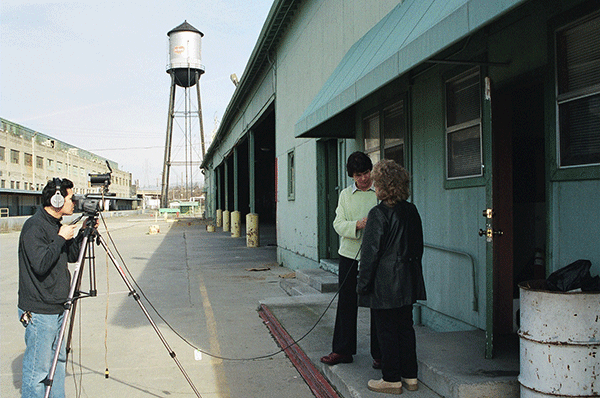
From 2006-2007, we received a $25,000 contract from the local museum History San José, to conduct research for their new online exhibit entitled Cannery Life, documenting the soon to be demolished Del Monte Cannery No. 3. What we learned on this project would eventually cause us to refocus our efforts on the Mexican agricultural and cannery population during the period from 1920 to 1960, a time when labor and social organizing was at its peak, agricultural industries were dominant, and migration and immigration were influenced by world events such as the Great Depression, the Mexican Revolution and two World Wars. At that time, History San José had no contacts in the Latino community and no one spoke Spanish, so we were able to retain more control over the structure of the project as long as we met their timeline. We implemented some new strategies in our research. Utilizing a number of trained Spanish speaking SJSU students from Margo McBane’s California and Local History classes at San José State University, we were able to form a bilingual research team and tap into their social networks to identify fifteen cannery employees. Video interviews were conducted in Spanish and in English, with Spanish transcripts translated into English. Many of the workers had retained personal artifacts, along with photos of the workplace, which they shared with us, and we facilitated their donation to History San José. Over the years, many of these same students that worked this project became the corps of researchers for our later efforts, continuing to work after graduation.
The insights gained from our research encouraged us to revise our project concept, and in 2007 it became the Before Silicon Valley Project: Mexican Agricultural and Cannery Workers in Santa Clara County, 1920-1960, envisioned as a national traveling exhibit with website and online exhibit. We also began to identify several overall themes and an approach that framed the 20th century Mexican American history we were retrieving within recent research in Labor, Women’s, American History, Ethnic Studies and the Long Civil Rights Movement. In 2007, we received $7,500 from the Farrington Historical Foundation to continue collecting and processing Mexican cannery worker interviews. In 2010, we received a $29,000 Global Institute SJSU Grant that enabled us to further develop the exhibit concept.
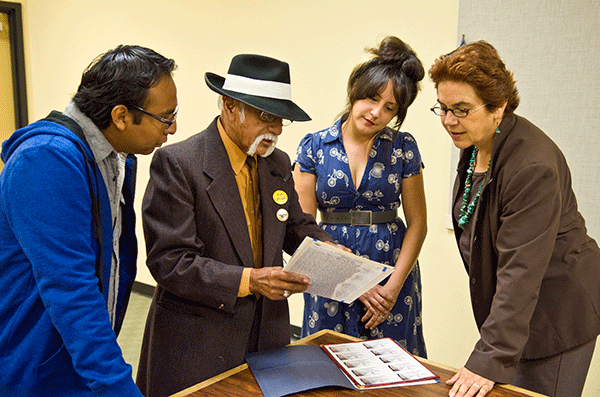
In 2011, sponsored by San José State University, and co-directed by Dr. Ann Fountain, professor of World Languages and Literature and Dr. Margo McBane, History lecturer at SJSU, we applied for an $80,000 NEH Planning Grant but received only a $40,000 Grant to design and plan a traveling and online exhibit. This was the first grant from NEH ever received by SJSU0. We then pursued local grants and contracts to make up for the shortfall in the NEH Grant that would enable us to conduct and process 25 additional oral history interviews based on the new exhibit themes. During 2011-2012, we received a $12,000 Castellano Family Foundation grant to continue collecting and processing Mexican agricultural workers oral history interviews.
That same year, The County of Santa Clara contracted Guerra & McBane, LLC to conduct Oral Histories in Support of Cultural Resources Study of Sites Associated with Cesar Chavez National Heritage Trail. We interviewed family and associates of César Chávez in Spanish and in English, and documented the role of Guadalupe Church with Fr. McDonnell Hall as a center for community organizing and training. This research contributed to a proposed National Historic Landmark nomination on César Chávez and agricultural labor rights.
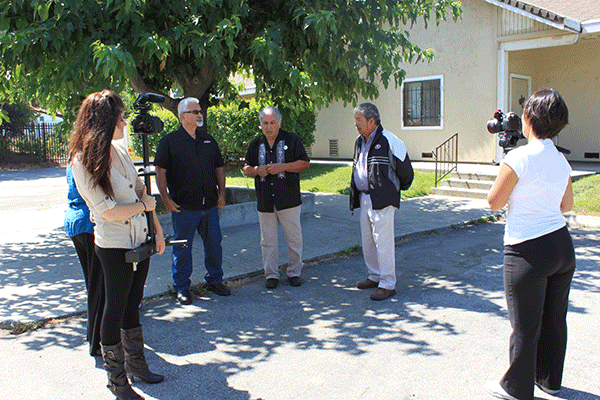
Ten years after Suzanne conducted the first study of the Palomar, in 2012, The City of San José contracted Guerra & McBane LLC to research, plan and create an interpretive exhibit to mitigate the demolition of the Palomar Ballroom, listed on the National Register. Oral history interviews would form the core of our research this time. Reaching out again to community contacts, we conducted interviews with musicians, singers, band managers, venue managers, entertainment writers and former patrons. These interviews enabled us to profile the history of the Ballroom as a regional center for social, cultural and political activity, and San José as a regional hub for the Mexican American community in Northern California.
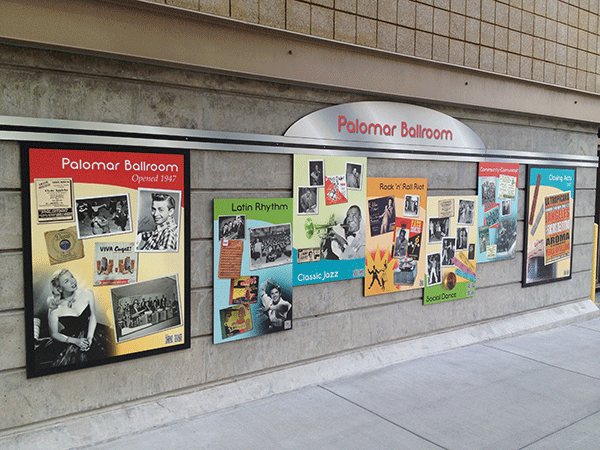
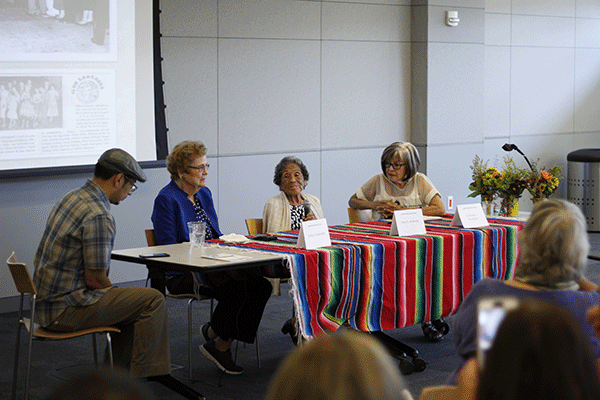
In 2016, local interest in our cannery worker research was growing. We were asked for 2016 Hispanic Heritage Month to give a talk on San José Mexican Cannery Women at the Eastside Branch of San Jose Public Library. Over 150 people attended, with one of the attendees asking us to present the same talk for Women’s History Month at the San José Women’s Club Annual Meeting. In 2017 we continued our research and representation back to the community with a California Humanities funded Quick Grant Project Cannery Workers, Cannery Lives Community Conversation for Hispanic Heritage Month. We had an Oral History/Photo Scan Day in SJSU Special Collections in late September. In early October we represented the oral history information back to the community through Community Conversations held at two branch libraries of San José Public Library. These Public Programs included a cannery worker panel, a scholar talk and mini-documentary program. Programs were very well attended, with friends and family of interviewees and the general public, and expanded on our network of community contacts.
After reviewing the original NEH proposal with our advisors in 2014-2016, we did additional research and completely revised our proposal in preparation for applying for an NEH Implementation Grant to create the traveling and online exhibit. After several unsuccessful applications to the NEH Implementation Grant for Museums and Historical organizations, with the offer of Kathryn Blackmer Reyes to host the Website on the AAACNA (Africana, Asian American Chicano, and Native American) Cultural Center web page, we decided just to pursue an Online Exhibit. In 2019, through the San José Parks Foundation, we then applied for and received $202,000 from the County of Santa Clara’s Historic Grant Program for the bilingual BEFORE SILICON VALLEY PROJECT Website hosted by the SJSU Library. Further funding from The Silicon Valley Community Foundation and individual donors allowed us to complete the mini-documentaries for the online exhibit.
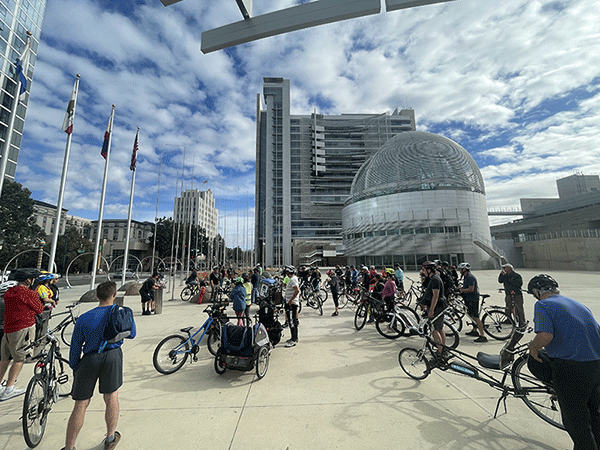
From the beginning of this Project it has been important to us to bring all the information shared with us back to the communities from which it came. Funded by the The San José City Abierto Grant and California Humanities “Humanities for All” Grant, starting in 2023 we held 6 public programs. To commemorate César Chávez Day, in April through May 2023, with over 300 people attending, we helped to organize a Cannery Worker Commemoration at The Gardner Community Center, in the heart of the Mexican cannery worker neighborhood. After this success, we held five more Public Programs, attracting over 300 people in total, featuring a similar format: a Scholar Speaker, a featured Mini-Documentary, and an introduction to the Website. These public programs covered the topics of “Mexican Civil Rights in the 1950s”, “Mexican Women Cannery Workers”, “Mexican Orchard and Field Workers” and “Mexican Bands and Music, 1920-1960”. They were held at Mt View Historical Association in collaboration with Los Altos History Museum, The History Center at De Anza College, Gavilan College, and The Fire Hose at History San José sponsored by The La Raza Historical Society.
For Hispanic Heritage Month 2023, attracting over 200 attendees, we held in one day a 10 mile Bicycle History Tour of Mexican Sites in San José as well as a Mexican Tardeada/Family Dance featuring a taco truck and a 15 piece orchestra (with players from the descendants of the original Bernie Fuentes Band).
Directors
Margo McBane, Ph.D. (2007-2024) Project Lead Director: Oral History Supervisor, Mini-Docs Supervisor, Website Supervisor, Online Exhibit Supervisor, Grant Writing Supervisor, Scholar Speaker
Kathryn Blackmer Reyes (2019-2024) Project Co-Director: Library Coordinator, Oral History Translator/Interviewer, Scholar Speaker
Ann Fountain, Ph.D. (2010-2016) Past Project Co-Director: Grant Writer, Translator
Suzanne Guerra (2007-2024) Project Co-Director: Exhibit Text Co-Writer, Photo Curator, Social Media Historian, Grant Writer, Scholar Speaker
Fernando Pérez (2017-2023) Project Co-Director: Media, Social Media and Video Supervisor
Mini-Documentaries
Noah Blough: Sound Consultant
Juan Antonio Cuéllar: Music Advisor
Suzanne Guerra: Photo Curator, Editing Advisor, Grant Writer
Barbara McBane, Ph.D.: Editing and Sound Consultant
Margo McBane, Ph.D.: Script writer, Editing Advisor, Grant Writer
Chris Simon: Mini-Documentary Director
Oral History/Photo Collection
Robert Baines (2011): Photographer and Photo Editor
Kathryn Blackmer Reyes (2019-2023): Oral History Interviewer/Translator
Armando Catalan (2011-2022): Oral History Photographer, Interviewer/Translator/Transcriber, Photo Scanner
Leslie Corona (2020): Oral History Interviewer/Transcriber
Bard Foster (2011): Videographer
David Foster(2023): Oral History Photographer
Liliana Francisco (2011): Oral History Interviewer/Translator, Photo Scanner
Stephanie Fryslie (2006): Oral History Transcriber
Robert Gliner, Ph.D. (2006): Videographer
Suzanne Guerra (2006-2023): Photo Curator, Grant Writer
Yolanda Guerra (2011-2022): Oral History Transcriber/Translator
Andrea García Villa (2011-2021): Videographer, Transcriber/Translator, Photo Editor, Video Editor
Margarita García Villa (2011-2023): Oral History Interviewer/Translator, Photo Scanner
Ema Kawamoto (2011-2023): Videographer, Video Editor and Producer
Victor Leoza (2011-2023): DVD Animator, Graphics Designer and Video Producer
Margo McBane, Ph.D. (1970s-2023): Oral History Coordinator: Oral History Interviewer, Photo Scanner, Transcriber, Grant Writer
Guadalupe Ortiz (2020-2022): Oral History Interviewer/Transcriber/Translator
Yolanda Ortiz (2011-2012): Oral History Interviewer/Translator, Photo Scanner
Fernando Pérez (2017-2023): Videographer and Editor
Dana Price (2006-2007): DVD Producer for Del Monte Project
Darby Price, Ph.D. (2006-2007): Videographer
Joseph Rivera (2006-2008): Oral History Interviewer/Translator
Mark Robertson (2007): Oral History Transcriber
Brea Romero (2006-2007): Video editor
Rick Romero (2006-2017): Videographer
Keith Sanders (2011-2012) : Oral History DVD Producer of Santa Clara Parks / Cesar Chavez Contract
Manuel Santana (2019-2023): Oral History Interviewer, Photo Scanner, Transcriber/Translator
Richard Scott (2017): Oral History Videographer and Mini-Documentary Editor for Cannery Public Program
Onawa Foster Virostko (2007): Oral History Photographer for Del Monte Project
David Foster (2021-2023): Photographer
Yolanda Ortiz: Interviewer, Transcriber/Translator
Oral History Interviewees:
Adema, Gabriel
Alvarez, Salvador Enrique
Andrade, Mary
Armendariz, Sally
Brooks, Yvonne
Barrientos, Mary
Carmelia, Evelyn
Cervantes, Elia and Trinidad Rodriguez
Cervantes, Elia
Chávez, Fernando
Chávez, Fernando and Paul
Coronado, Rudy
Cortese, Dominic
Cortez, Frank
De La Grande, Trinidad
Díaz, Richard and Elvira
Duran, Sid
Evans, Harry
Flores, Enedina
Flores, Rose
Gallegos, Herman
Gomez, Godofredo
González, Guadalupe
González, Mary
Gutiérrez, Elida
Healey, Dorothy
Jones, Angela Lopez
Lopez, Bertha and Jesus
Lopez, Victor
Maldenado, Arbelina
Medina, Rita Chavez
Medina, Rudolfo Chavez
Mendoza, Nellie
Mireles, Irma
Montoya, Jose
Mosqueda, Basilio
Munoz, Albert
Nicholas, Elizabeth
Nunez, Hope and Jose
Mendoza, Nellie
Pantoja, Jose
Pérez, John
Pérez, Rachel
Pérez, Socorro
Reyes, Mary Lou
Rivera, Jose
Rocha, Teresa
Rodriguez, Consuelo
Ross, Fred, Sr.
Rodriguez, Mary Ellen
Rosendin, Henry “Hank”
Sanchez, Beatrice and Julian
Sanchez, Fred
Shanrock, Clay
Tenes, Lily
Tenes, Lily and Rudolfo
Vásquez, Richard
Villareal, Carmen “Queenie”
Villareal, Leandro and Herminia
Wells, Frances Pacheco
Zamora, John
Project Advisors:
Dr. Hal Baron, Ph.D. (2010-2011): Professor, Emeritus, Department of Humanities, Social Sciences and The Arts, Harvey Mudd College
Dr. Magdalena L. Barrera, Ph.D. (2010-2016): Vice Provost for Faculty Success, SJSU
Dr. Manolo Callahan, Ph.D. (2016): Adjunct Faculty, St. Mary’s College of California
Dr. Alberto Camarillo, Ph.D. (2010-2016): Leon Sloss Jr. Memorial Professor, Emeritus, Stanford University
Dr. Julia E. Curry Rodíiguez, Ph.D. (2014-2023): Professor, Mexican American Studies, SJSU
Dr. Lori Flores, Ph.D. (2016): Associate Professor, History, Stony Brook University
Dr. Gilbert Gonzalez, Ph.D. (2010-2016): Professor, Emeritus, History Department, U.C. Irvine
Theresa Handley (2010-2014): Retired Director, Ontario Museum of History and Art
Dr. Francisco Jimenez, Ph.D. (2010-2016): Fay Boyle Professor, Emeritus, Department of Modern Language and Literature, University of Santa Clara
Dr. David Kahn, Ph.D. (2014-2016): Professor, Emeritus, Radio, Television, Film and Theater, SJSU
Dr. Glenna Matthews, Ph.D. (2010-2023): Independent Historian
Dr. Gregorio Mora-Torres, Ph.D. (2020-2023): Mexican American and Planning Lecturer, Emeritus, San Jose State University
Dr. Stephen Pitti, Ph.D. (2010-2023): Professor of History and American Studies; Director of the Center for the Study of Race, Indigeneity, and Migration, Yale University
Dr. Vicki Ruiz, Ph.D. (2011-2016): Distinguished Professor of History and Chicano/Latino Studies, Emerita, UC Irvine
Dr. George Sanchez, Ph.D. (2010-2011): Director of the Center for Diversity and Democracy and Professor of American Studies and Ethnicity, Emeritus, University of Southern California
Josie Talamantez (2010-2014): Retired Chief of Programs and Legislative Liaison, California Arts Council
Dr. Gabriel Thompson, Ph.D. (2016): Independent Scholar
Luiz Valdez (2010-2016): Independent Screenwriter, Director of Teatro Campesino and Professor, Emeritus, California State University Monterey Bay
Public Programming:
Adrian Avila: Poster/Flyer Graphics Designer
Kathryn Blackmer Reyes: Program MC
Armando Catalan: Program Speaker
Leslie Corona: Program Assistant
David Foster: Photographer
Margarita Garcia Villa: Program MC
Salvador Gurrola, Jr: Photographer
Michael Lara: Program Assistant (Edit and Insert video on why he is involved in the project)
Fernando Perez: Public Programming Co-Coordinator, Videographer, Grant Writer
Manuel Santana: Program MC
Richard Scott: Videographer
Jack Surmani: Videographer
Carlos Velazquez: Program MC (Insert Social Media video on why he is involved in the project)
Daniel Zapien: Photographer
Scholar Talks:
Kathryn Blackmer Reyes: Scholar Speaker
Juan Antonio Cuellar: Scholar Speaker
Alberto García, Ph.D.: Scholar Speaker
Suzanne Guerra: Scholar Speaker
Glenna Matthews, Ph.D.: Scholar Speaker
Margo McBane, Ph.D.: Interviewer, Text Editor, Scholar Speaker
Gregorio Mora-Torres, Ph.D.: Scholar Speaker
Fernando Perez: Videographer, Video Editor, Titler
Matthew Perry: Scholar Speaker
Julia Rodriguez Curry, Ph.D.: Scholar Speaker
Social Media:
Suzanne Guerra: Photo Curator and History Advisor
Jeremiah Haze: Social Media Content Poster
Margarita Garcia Villa: Social Media Content Writer and Content Poster
Carlos Velazquez: Social Media Coordinator: Content Writer and Poster
Website:
Adrian Avila: Website Graphics Designer, Engineer and Builder
Kathryn Blackmer-Reyes: Liaison Between SJSU Library and Project
Susan Doniger: Website Text Editor, Website Advisor
Suzanne Guerra: Website Text Writer, Photo Curator, Social Media History Advisor Grant Writer
Margo McBane, Ph.D: Website Text Writer, Photo Curator, Additional Online Information Coordinator, Grant Writer, Public
Fernando Perez: Website Builder, Media (Scholar Talk Director/Editor, Mini-Documentary Editor) and Website Coordinator
Jean Shiota: Website Photo Editor, Website Advisor, Scholar Talk Editor for Media Page
SJSU Library Employees: Laurel Eby, Web Services Librarian; Lyna Nguyen, Website and Applications Administrator; Nick Szydlowski, Digital Scholarship Librarian
